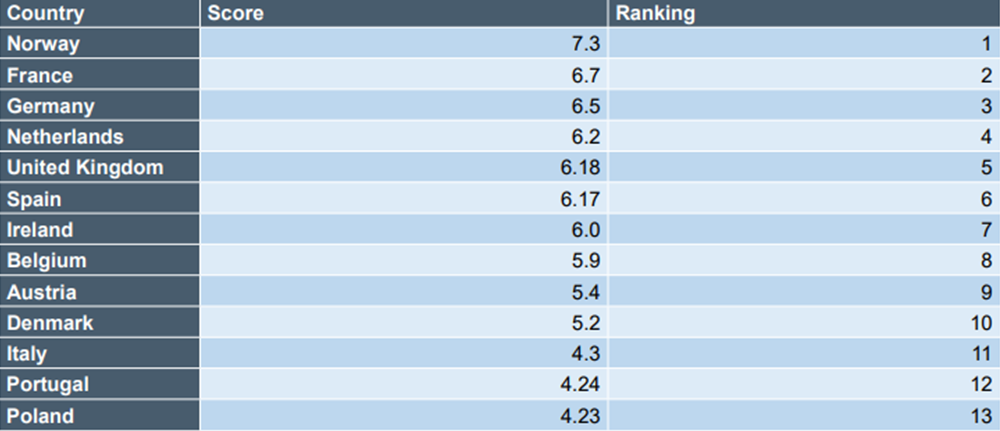Ireland has seen the highest growth in electric vehicle (EV) market share, rising an impressive 81.3% from 2021- 2022. The data taken from the new Electric Vehicle Country Attractiveness (EVCA) Index, developed by Cornwall Insight and law firm Shoosmiths, identified the year-on-year growth of large European countries with Ireland, Belgium, and Poland having emerged as top performers with growth rates of over 50% for all.
The index identified a range of factors1 from purchase subsidies to national EV charging targets upon which nations can be ranked accurately on their EV appeal, with Norway clinching the top spot overall. While Norway has been a leader in EV adoption due to subsidies, tax cuts, and a large-scale charging network, other countries are following suit, with market shares largely ranging from 10-20% across the index.
The transition to e-mobility has been a mixed bag amongst nations in the EVCA index, with some being enthusiastic supporters while others have been more hesitant. However, with most European nations, including Ireland, imposing a ban on the sale of new petrol and diesel passenger cars and light commercial vehicles (vans) by at least 2035, many nations have seen an increase in EV uptake in 2022, with the EV market expected to become more established across Europe.
Figure 1: EV Country Attractiveness index scores and rankings:

Jamie Maule, Research Analyst at Cornwall Insight:
“While the results of the Electric Vehicle Country Attractiveness Index may not come as a surprise, after all Norway is well known for its EV success, it is the promise for the future across Europe which is the most encouraging. Although the countries leading the Index, had an early advantage in implementing EV incentives, a larger market share is not the only indicator of success. Countries such as Ireland currently lower in the rankings are showing impressive year-on-year advancements, indicating a shift in interest towards the EV market.
“As the Index evolves, it will be interesting to see how countries move up the ranks through the implementation of new policies, targets, subsidies, and investment incentives, hopefully resulting in a surge of EV adoption throughout the continent.”
Calum Stacey, Legal Director in Shoosmiths’ Energy and Infrastructure Team said:
“The index highlights the differing approaches taken by European countries and how they wish to incentivise the transition to zero-emission vehicles.
“One of the key drivers for those countries towards the top of the Index is the allocation of public funds to support the rollout of the necessary charging infrastructure to support this transition. However, as can be seen in both Germany and the UK, the public funding model is likely to be time-limited with the private sector needing to step in once a critical mass in relation to EV adoption has been reached.”
Reference:
1. A range of indicators, subject to differing weightings, have been utilised in the production of this index. They are listed as follows without regard to importance or weighted value: